Related Research Articles

Mystara is a campaign setting for the Dungeons & Dragons fantasy role playing game. It was the default setting for the "Basic" version of the game throughout the 1980s and 1990s. Most adventures published for the "Basic" edition of D&D take place in "The Known World", a central continent that includes a varied patchwork of both human and non-human realms. The human realms are based on various real-world historical cultures. In addition, unlike other D&D settings, Mystara had ascended immortal beings instead of gods.
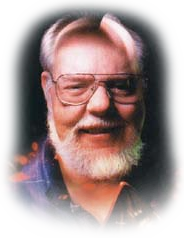
David Lance Arneson was an American game designer best known for co-developing the first published role-playing game (RPG), Dungeons & Dragons, with Gary Gygax, in the early 1970s. Arneson's early work was fundamental to the role-playing game (RPG) genre, pioneering devices now considered to be archetypical, such as cooperative play to develop a storyline instead of individual competitive play to "win" and adventuring in dungeon, town, and wilderness settings as presented by a neutral judge who doubles as the voice and consciousness of all characters aside from the player characters.

Blackmoor is a fantasy role-playing game campaign setting generally associated with the game Dungeons & Dragons. It originated in the early 1970s as the personal setting of Dave Arneson, the co-creator of Dungeons & Dragons, as an early testing ground for what would become D&D.

Scourge of the Slave Lords (A1–4) is an adventure module for the Dungeons & Dragons fantasy role-playing game, published by TSR, Inc. in 1986. It combines the contents of four earlier modules, all set in the World of Greyhawk campaign setting and intended for use with Advanced Dungeons & Dragons first edition rules.
The monk is a playable character class in most editions of the Dungeons & Dragons fantasy role-playing game. A D&D monk is a fantasy martial artist, specializing in unarmed combat.
David Wesely is an American wargamer, board game designer, and video game developer. Wesely's developments, inspired by Kriegsspiel wargames, were important and influential in the early history of role-playing games.

Robert J. Kuntz is a game designer and author of role-playing game publications. He is best known for his contributions to various Dungeons & Dragons-related materials.

David "Zeb" Cook is an American game designer, best known for his work at TSR, Inc., where he was employed for over fifteen years. Cook designed several games, wrote the Expert Set for Dungeons & Dragons, worked as lead designer of the second edition of Advanced Dungeons & Dragons, and invented the Planescape setting for AD&D. He is a member of the Origins Hall of Fame.
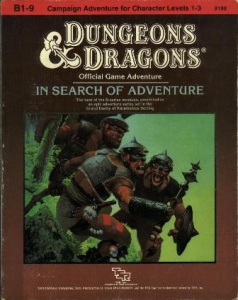
In Search of Adventure is an abridged compilation adventure module published by TSR, Inc. in 1987, for the Basic Set of the Dungeons & Dragons (D&D) fantasy role-playing game. Its product designation was TSR 9190. This 160-page book features cover artwork by Keith Parkinson.
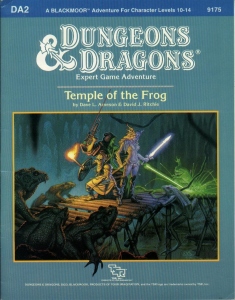
Temple of the Frog (ISBN 0-88038-317-8) is a 48-page 1986 adventure module for the Dungeons & Dragons roleplaying game. Its module code is DA2 and its TSR product code is TSR 9175. Another version of it was originally released in 1975 as part of the Blackmoor supplement.

City of the Gods is a 1987 adventure module for the Dungeons & Dragons role-playing game. Its module code is DA3 and its TSR product code is TSR 9191.

The Dungeons & Dragons Basic Set is a set of rulebooks for the Dungeons & Dragons (D&D) fantasy role-playing game. First published in 1977, it saw a handful of revisions and reprintings. The first edition was written by J. Eric Holmes based on Gary Gygax and Dave Arneson's original work. Later editions were edited by Tom Moldvay, Frank Mentzer, Troy Denning, and Doug Stewart.
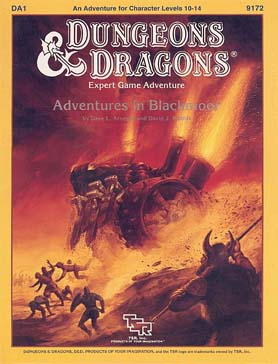
Adventures in Blackmoor is a 64-page Dungeons & Dragons fantasy role-playing game adventure, designed to be compatible with the Dungeons & Dragons Expert Set.

The DA module series is a series of four adventures for the Dungeons & Dragons role-playing game, designed to be compatible with the Dungeons & Dragons Expert Set. They were written for character levels 10–14 by Dave Arneson and David J. Ritchie and published from 1986 to 1987.
Jon Pickens is an American game designer and editor who has worked on numerous products for the Dungeons & Dragons fantasy role-playing game from TSR and later Wizards of the Coast.

Night of the Seven Swords is a 1986 adventure module for the Oriental Adventures rules of the Advanced Dungeons & Dragons fantasy role-playing game.
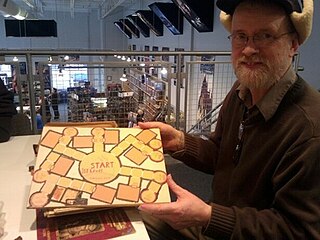
David R. Megarry is a game designer most notable for the board game Dungeon!.

The Conan Role-Playing Game is a fantasy role-playing game published by TSR, Inc. in 1985 that is based on the Conan the Barbarian stories by Robert E. Howard, Lin Carter, Andrew J. Offutt. and Robert Jordan.
This is a complete list of works by American science fiction and fantasy author Margaret Weis.
References
- ↑ "United States Social Security Death Index," index, FamilySearch (https://familysearch.org/pal:/MM9.1.1/JGGR-2YC : accessed 07 Dec 2013), David Ritchie, 6 September 2009; citing U.S. Social Security Administration, Death Master File, database (Alexandria, Virginia: National Technical Information Service, ongoing).
- 1 2 3 "David Ritchie Obituary - Canton, OH | The Repository". legacy.com. Retrieved 13 Feb 2015.
- 1 2 3 4 Shannon Appelcline (2011). Designers & Dragons. Mongoose Publishing. ISBN 978-1-907702-58-7.
- ↑ "The Omega War (1983)". boardgamegeek.com. Retrieved 2021-10-15.
- ↑ Pickens, Jon, David "Zeb" Cook, Harold Johnson, Rick Swan, Ed Carmien, and David James Ritchie. Night of the Seven Swords (TSR, 1986)
- ↑ Ritchie, D.; Ritchie, D. (1991). Connecticut: Off the Beaten Path. Globe Pequot Press. ISBN 9780871062406 . Retrieved 13 Feb 2015.